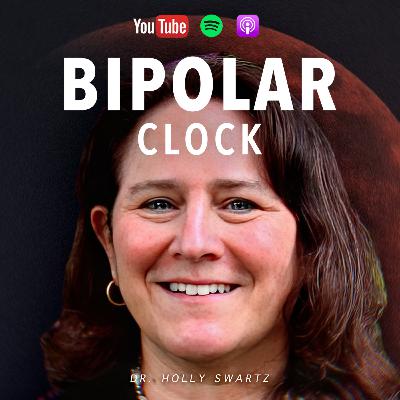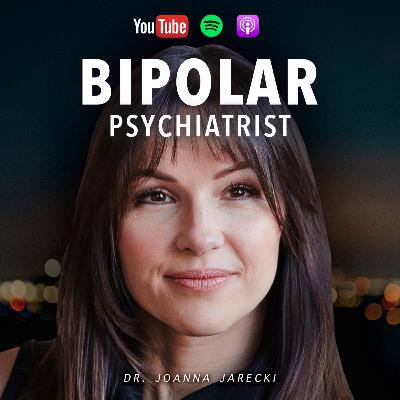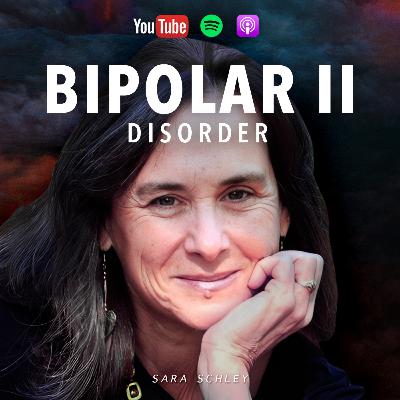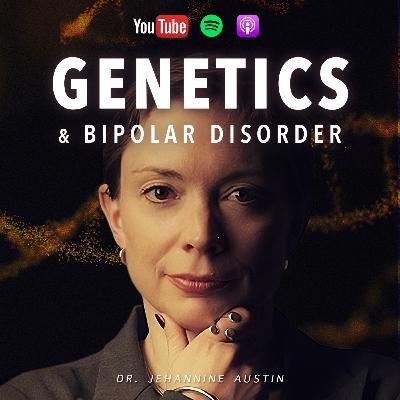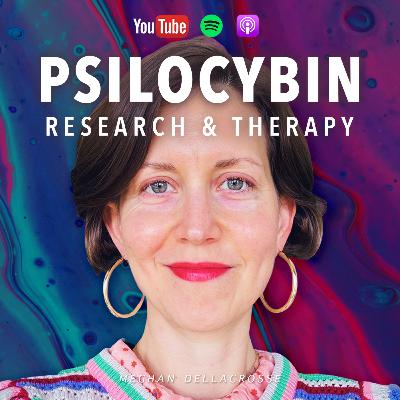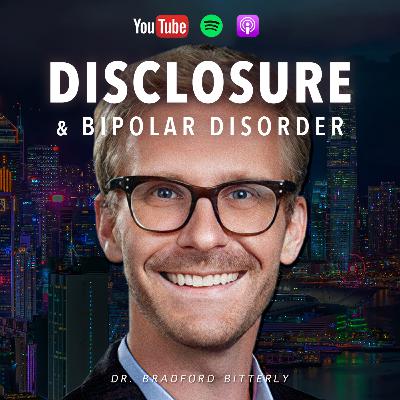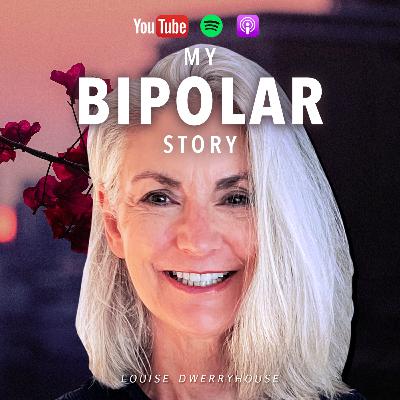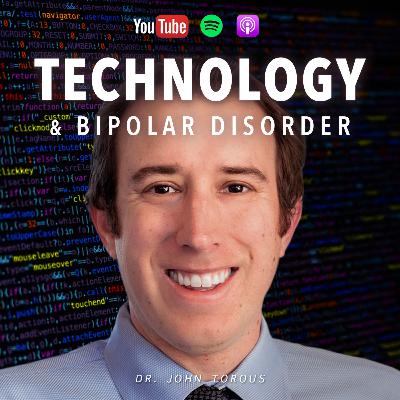Discover talkBD Bipolar Disorder Podcast
talkBD Bipolar Disorder Podcast

talkBD Bipolar Disorder Podcast
Author: CREST Bipolar Disorder Network
Subscribed: 42Played: 483Subscribe
Share
© CREST Bipolar Disorder Network
Description
talkBD gathers top bipolar experts, psychiatrists, psychologists, and researchers from around the world to discuss and answer live questions on a topic area important to life with bipolar disorder. Learn about upcoming episodes, mental health resources, and more from our bipolar disorder experts at: https://talkBD.live.
Hosted by international bipolar disorder research network CREST.BD.
Hosted by international bipolar disorder research network CREST.BD.
40 Episodes
Reverse
Award-winning researcher Dr. Holly Swartz breaks down the "bipolar clock", and proposes a fresh approach to take charge of your bipolar symptoms by timing your light exposure, temperature, body position, eating, and social contact. Dr. Swartz also discusses the science behind social rhythm therapy (SRT) and Interpersonal and Social Rhythm Therapy (IPSRT), and presents a fresh approach to reset your biological body clock and take charge of your bipolar symptoms.
(00:00) Introduction
(00:13) About Dr. Holly Swartz
(04:00) Circadian Rhythms Are Key for Bipolar Disorder
(08:37) Advantages of Having a "Bipolar Clock"?
(11:42) Light Disruptions, Season Changes, Blue Light
(16:51) Create Consistent Routines
(20:51) Time Your Eating, Body Position, Social Contact, Temperature
(29:08) Track Your Social Rhythm Metric (SRM)
(30:25) Interpersonal and Social Rhythm Therapy (IPSRT)
(33:33) Social Rhythm Therapy Workbook for Bipolar Disorder
(36:00) Strive for a Supranormal Routine
Learn more and share this episode: https://bipolarclock.com
Dr. Holly A. Swartz is Professor of Psychiatry at the University of Pittsburgh School of Medicine and President of the International Society of Bipolar Disorders (ISBD). She received her undergraduate degree from Harvard College, medical degree from Albert Einstein College of Medicine, and completed her psychiatric residency training at New York Hospital / Cornell University School of Medicine.
Dr. Swartz’s research focuses on understanding and optimizing treatments for mood disorders. She is well known for her work evaluating Interpersonal Psychotherapy (IPT) and Interpersonal and Social Rhythm Therapy (IPSRT) as treatments for depression and bipolar disorder. Her research focuses on the role of IPSRT and pharmacotherapy in the management of bipolar II depression and IPT in the management of maternal depression. She is engaged in collaborative projects to develop computational frameworks to model dyadic interpersonal behaviors in relation to psychotherapy process and outcomes and to understand neural correlates of change in chronotherapeutic behavioral interventions. Her research has been funded by the National Institute of Health, National Science Foundation, and the Brain and Behavior Research Foundation.
This episode is hosted by Dr. Erin Michalak and produced by Caden Poh.
#talkBD Bipolar Disorder Podcast
talkBD gathers researchers, people with lived experience, healthcare providers, and top bipolar disorder experts from around the world to discuss and answer the most important questions about living with bipolar disorder.
Learn more about talkBD: https://talkBD.live
Over 2,400 years ago, Greek physician Hippocrates first detailed symptoms of "opposite" mood states - what we now understand as mania and depression. Throughout the Middle Ages and into the modern era, vivid descriptions of melancholy and euphoria continued to surface, drawing focus to a set of distinct symptoms that appeared to occur in cycles.
In this special talkBD episode, psychiatrist Dr. Manuel Sánchez de Carmona dives through centuries of evidence to uncover the fascinating story of manic-depression - and how we've come to know the condition today as "bipolar disorder".
(00:00) Introduction
(01:54) Virginia Woolf Knew She Was Ill
(03:58) Ancient Greece & Rome
(09:22) 19th Century France & Germany
(14:18) The Circular Pattern of Bipolar Disorder
(18:52) The Modern Era
(21:00) The Bipolar Spectrum
(24:14) The DSM & History of Mixed Features
(27:04) Today: Key Figures, Advocacy, World Bipolar Day
(31:50) The Term "Bipolar Disorder" Is Inaccurate?
(35:20) King George III & Life Charting
(41:49) Learning from Your History
People referenced
Ancient & Classical: Hippocrates, Aristotle, Aretaeus of Cappadocia, Posidonius
19th Century: Jean-Pierre Falret, Jules Baillarger, Karl Kahlbaum, Emil Kraepelin, Vincent van Gogh, King George III
Modern Era: Virginia Woolf, Karl Leonhard, Jules Angst, David Kupfer, Ellen Frank
Today: Kurt Cobain, Carrie Fisher, Kanye West, Britney Spears
Share this episode: http://bipolarhistory.com
Dr. Manuel Sánchez de Carmona is a member of the ISBD Board of Directors and works as an associate professor of Clinical Psychiatry for the Anahuac University in Mexico City, Mexico. He began his involvement with ISBD in 2008 as the founder of the ISBD Mexican Chapter and since then in key leadership roles: first as ISBD Secretary Treasurer and then as ISBD President, serving for two consecutive terms from March 2014 to December 2017. He was able to actively promote the Society and generate local chapters in several countries of Latin America, Asia, and Europe. He is passionate about providing education on bipolar disorders and using the Society as a game-changer in public mental health services. Since World Bipolar Day’s inception, he has been involved in its global promotion and making connections with experts with the lived experience to generate community awareness and fight stigma. Dr. Sanchez de Carmona has more than 30 years of clinical experience treating mood disorders and is interested in diagnosis, early detection, and providing quality of life to patients.
This episode is hosted by Dr. Erin Michalak and produced by Caden Poh.
#talkBD Bipolar Disorder Podcast
talkBD gathers researchers, people with lived experience, healthcare providers, and top bipolar disorder experts from around the world to discuss and answer the most important questions about living with bipolar disorder.
Learn more about talkBD: https://talkBD.live
Psychiatrist Dr. Joanna Jarecki shares a powerful story of living with bipolar disorder - from spiralling into depression to being taken to hospital in handcuffs during mania. Dr. Jarecki reveals how her experience with bipolar I disorder turned her to psychiatry to help others in their recovery journey, and delivers a heartfelt message of hope that living well with bipolar disorder is possible. Hosted by Dr. Erin Michalak.
(00:00) Introduction
(01:52) Growing Up & Early Signs
(03:01) First Depressive Episode: "My World Was Ending"
(08:14) Mania: Grandiosity & Delusions
(10:52) Handcuffs & Hospitalization: "Fighting for My Life"
(15:02) The Aftermath: Shame, Treatment & Rebuilding
(21:49) Bipolar Disorder Made Me a Better Psychiatrist
(26:43) Why Recovery Is Possible
(30:58) What Psychiatrists Fail to Understand
(37:57) "I Promise You, Things Will Get Better"
(40:17) Thank Yous & Unconditional Acceptance
Dr. Joanna Jarecki is a Psychiatrist with interests in Mood Disorders, ADHD, Maternal/Peri-natal mental health, and physician health, and an Assistant Clinical Professor at McMaster University in Ontario, Canada. Her clinical approach has been influenced by her own lived experience with Bipolar Disorder, Type I, and her journey of recovery. Through this journey, and witnessing the recoveries of many patients, she has learned that people with bipolar disorder can flourish and live a full and meaningful life. She is passionate about sharing her story with the intention that it gives hope to others living with BD.
More on this episode: https://talkBD.live/bipolar-psychiatrist
#talkBD Bipolar Disorder Podcast
talkBD gathers researchers, people with lived experience, healthcare providers, and top bipolar disorder experts from around the world to discuss and answer the most important questions about living with bipolar disorder.
Learn more about talkBD: https://talkBD.live
A remarkable story of living with bipolar disorder: 36-year US Army retired combat veteran Maj. Gen. Gregg. F. Martin shares his experience of bipolar disorder after joining the army at 18, and how his symptoms remained hidden and undiagnosed despite alarming warning signs during multiple deployments and stages of his military career. Gregg Martin also details his route to recovery, bipolar disorder in his family, and his top strategies to live well with bipolar disorder. Hosted by Dr. Erin Michalak.
(00:00) Intro
(00:52) Joining the Army & Early Years
(06:51) The Iraq War & Paranoia
(11:22) Depression - "The Crash"
(13:27) "The Real Mania"
(16:45) How My Bipolar Symptoms Were Hidden
(19:31) My Diagnosis Was Exposed
(24:23) Rebuilding Relationships (Family & Friends)
(28:12) Two Sons Also Have Bipolar Disorder
(29:02) Reflecting on Misdiagnosis
(34:12) "You Will Pull Out of This"
(35:21) Message to Maggie (Wife)
(37:35) Daily Wellness Routine
(40:21) Bipolar General - The Book
Gregg F. Martin PhD, is a 36-year Army combat veteran, bipolar survivor and thriver, and retired two-star general. A former president of the National Defense University, he has lived most of his life on the Bipolar Spectrum, and is a qualified Airborne-Ranger-Engineer and strategist, who holds degrees from West Point and MIT. An author, speaker, and mental health advocate, he lives with his wife in Cocoa Beach, Florida.
Gregg's new book: “Bipolar General: My Forever War with Mental Illness”_ is available on Amazon (Hardcover/Kindle). The book is published by the US Naval Institute Press and endorsed by the Association of the US Army. For more information, visit https://generalgreggmartin.com
More on this episode: https://talkBD.live/bipolar-general
#talkBD Bipolar Disorder Podcast
talkBD gathers researchers, people with lived experience, healthcare providers, and top bipolar disorder experts from around the world to discuss and answer the most important questions about living with bipolar disorder.
Learn more about talkBD: https://talkBD.live
Author Sara Schley recounts her story of living with bipolar II disorder - from her first episode of depression in college, to publishing her memoir after keeping it a secret for over 40 years. Sara also breaks down why people with bipolar II disorder are commonly misdiagnosed, her upcoming film on bipolar disorder - BrainStorm, and the life lessons she practices to live well with bipolar disorder. Hosted by Dr. Erin Michalak.
(00:00) Intro (01:23) Depression and the Early Years (04:19) The "Family Disease" (06:05) Misdiagnosing Bipolar II - "Why Am I Still Depressed?" (12:05) Ways to Prevent Relapse (14:21) Practice "PECS" to Stay Well (21:26) 4 Ways to Support Someone with Bipolar Disorder (27:00) Telling My Story After 40 Years - "Melting Off the Shame" (30:11) Sara’s Memoir: BrainStorm (32:35) BrainStorm the Film
Sara Schley is the author of the acclaimed memoir, BrainStorm: From Broken to Blessed on the Bipolar Spectrum. She is a business consultant, speaker, and author who has led organizational transformations at renowned companies around the world. Sara is a mother, grandmother, community leader, and has been married to a great guy for twenty-six years. She also has a Bipolar II brain, on the Bipolar Spectrum. Sara has kept this mostly a secret for four decades. Until now. She is choosing to tell her riveting story – from broken to blessed – to save lives, end stigma, and optimize healing for millions. Sara is also a writer and producer of BrainStorm – an upcoming film inspired by her memoir.
More on this episode: https://talkBD.live/bipolar-ii-disorder
#talkBD Bipolar Disorder Podcast
talkBD gathers researchers, people with lived experience, healthcare providers, and top bipolar disorder experts from around the world to discuss and answer the most important questions about living with bipolar disorder.
Learn more about talkBD: https://talkBD.live
36-year US Army combat veteran Maj. Gen. Gregg. F. Martin and psychiatrist Dr. Manuel Sánchez de Carmona break down psychosis through their extensive lived and clinical expertise - delving into common triggers, treatment and medication, and psychotic symptoms including paranoid ideas, persecutory delusions, hallucinations, and disorganized thought and behaviour. Gregg Martin also recounts harrowing psychotic episodes of "bipolar hell" during the Iraq War and through his service in the army, his route to recovery, rebuilding damaged relationships, and living well with bipolar disorder. Hosted by Dr. Erin Michalak.
(01:31) What Does Psychosis Look Like?
(02:28) About Gregg Martin
(06:54) About Dr. Manuel Sánchez de Carmona
(09:13) My Psychosis Story: What Happened in Iraq
(14:48) Psychosis Explained: What Is It?
(17:47) Stress Triggered Gregg's Psychosis
(21:58) Identifying & Blocking Paranoid Thoughts
(25:41) Know Your Early Warning Signs
(28:28) Must You Treat Mild Psychosis?
(30:17) Medication, Therapy & Support
(32:28) Gregg's 5Ps for Recovery
(35:09) Manuel's Top Tips to Prevent Relapse
(38:35) Losing Relationships: Forgiveness & Healing
(47:08) A Message to Those Experiencing Psychosis
(50:18) Gregg's Advice to His Younger Self
Gregg F. Martin, PhD, is a 36-year Army combat veteran, bipolar survivor and thriver, and retired two-star general. A former president of the National Defense University, he has lived most of his life on the Bipolar Spectrum, and is a qualified Airborne-Ranger-Engineer and strategist, who holds degrees from West Point and MIT. An author, speaker, and mental health advocate, he lives with his wife in Cocoa Beach, Florida. His forthcoming book, _“Bipolar General: My Forever War with Mental Illness”_ is available on Amazon, and is being published by the US Naval Institute Press, and endorsed by the Association of the US Army. For more information, visit https://generalgreggmartin.com
Dr. Manuel Sanchez de Carmona is a member of the ISBD Board of Directors and works as an associate professor of Clinical Psychiatry for the Anahuac University in Mexico City, Mexico. He began his involvement with ISBD in 2008 as the founder of the ISBD Mexican Chapter and since then in key leadership roles: first as ISBD Secretary Treasurer and then as ISBD President, serving for two consecutive terms from March 2014 to December 2017. He was able to actively promote the Society and generate local chapters in several countries of Latin America, Asia, and Europe. He is passionate about providing education on bipolar disorders and using the Society as a game-changer in public mental health services. Since World Bipolar Day’s inception, he has been involved in its global promotion and making connections with experts with the lived experience to generate community awareness and fight stigma. Dr. Sanchez de Carmona has more than 25 years of clinical experience treating mood disorders and is interested in diagnosis, early detection, and providing quality of life to patients.
More on this episode: https://talkBD.live/living-with-psychosis
Full credit and many thanks to ENR for Iraq War footage used in this episode. Watch ENR's full feature video for Gregg Martin's ENR Award of Excellence:
https://www.youtube.com/watch?v=Xuo5qexC8IQ#talkBD Bipolar Disorder Podcast
talkBD gathers researchers, people with lived experience, healthcare providers, and top bipolar disorder experts from around the world to discuss and answer the most important questions about living with bipolar disorder.
Learn more about talkBD: https://talkBD.live
Sexual health researcher Dr. Heather Armstrong and mental health educator Victoria Maxwell break down how bipolar disorder, mania, depression, and medication impacts sex, how to deal with hypersexuality and low libido, and strategies to improve your sexual well-being. Hosted by Dr. Emma Morton.
(03:46) About Dr. Heather Armstrong(04:38) About Victoria Maxwell(06:32) How of Bipolar Disorder Affects Sex(09:23) Hypersexuality & Triggers(14:35) Low Sexual Interest(17:10) Talking About Sex Is Challenging(20:42) How Medication Affects Sex & Dysfunction(26:33) Warning Signs & Preventing Hypersexuality(34:15) Pornography/Masturbation Triggers Mania?(36:24) How to Explain Hypersexuality to Your Partner(48:21) Solving Low Desire & Building Intimacy(55:10) Shame & Recovery from Hypersexuality(59:54) Is Increased Sex Drive Always Bad?
Dr. Heather Armstrong is an Assistant Professor in Sexual Health at the University of Southampton in Southampton, United Kingdom. She is also a chartered psychologist with the British Psychological Society. Her research primarily focuses on improving sexual health and well-being among sexual and gender minority people. She has presented her work at national and international conferences around the world and has published 60 journal articles and numerous book chapters. She is an Associate Editor at Sexual Health and is on the editorial boards of the Journal of Sex Research, Archives of Sexual Behavior, BMJ STI, and the Canadian Journal of Human Sexuality.
Since being diagnosed with bipolar disorder, psychosis, and anxiety, Victoria Maxwell has become one of North America’s top speakers and educators on the lived experience of mental illness and recovery, dismantling stigma and returning to work after a psychiatric disorder. As a performer, her funny, powerful messages about mental wellness create lasting change in individuals and organizations. By sharing her story of mental illness and recovery she makes the uncomfortable comfortable, the confusing understandable. The Mental Health Commission of Canada named her keynote That’s Just Crazy Talk as one of the top anti-stigma interventions in the country.
More on this episode: https://talkBD.live/sex
#talkBD gathers researchers, people with lived experience, healthcare providers, and top bipolar disorder experts from around the world to discuss and answer the most important questions about living with bipolar disorder. Learn more about the talkBD Bipolar Disorder Podcast and upcoming episodes at https://talkBD.live
Neuropsychiatric geneticist Dr. Jehannine Austin offers a fascinating insight into “bipolar gene” and “bipolar jar”, genetic and environmental factors that increase the risk for bipolar disorder, the latest in genetic testing for bipolar disorder, and what you should know before having children as a parent with bipolar disorder.
Hosted by Dr. Erin Michalak.
Dr. Jehannine Austin is the Executive director of the BC Mental Health and Substance Use Services Research Institute and Professor in Psychiatry & Medical Genetics. Dr. Austin is a board-certified genetic counselor and their research work involves studying the impact of genetic counseling for people with bipolar disorder and psychiatric disorders, and their families. Dr. Austin heads the Translational Psychiatric Genetics Group which includes the world’s first specialist psychiatric genetic counselling service. Dr. Austin member of the College of the Royal Society of Canada, and a Fellow of the Canadian Academy of Health Sciences. Dr. Austin’s work aims to make psychiatric genetics relevant to people with mental illness and their families by developing new counseling-based and biologically-based treatments.
More on this episode: https://talkBD.live/genetics
Translational Psychiatric Genetics Group (TPGG): https://bcchr.ca/TPGG
National Society of Genetic Counselors: https://nsgc.org
#talkBD gathers researchers, people with lived experience, healthcare providers, and top bipolar disorder experts from around the world to discuss and answer the most important questions about living with bipolar disorder. Learn more about the talkBD Bipolar Disorder Podcast and upcoming episodes at https://talkBD.live
Psychedelics researcher Meghan DellaCrosse breaks down her research on psilocybin, the results from a new study looking at magic mushrooms use for bipolar disorder, the benefits and drawbacks of using psilocybin, and the future of psychedelics research for mental health.
Hosted by Dr. Emma Morton.
Meghan DellaCrosse is a doctoral candidate in clinical psychology at the Wright Institute in Berkeley, CA. Following completion of pre-doctoral internship at Wexner Medical Center’s Early Psychosis Intervention Center at the Ohio State University (OSU) in June 2023, Meghan will begin a post-doctoral fellowship at the Center for Psychedelic Drug Research and Education at the OSU College of Social Work. She has contributed to research and manuscript development as a part of the Translational Psychedelic Research (TrPR) Program at UCSF where she also worked as a clinical assessor on various studies including investigations of social deficits in Veterans with schizophrenia, and psilocybin as a novel treatment for depression and Parkinson’s disease. Meghan is passionate about interdisciplinary research and holds master’s degrees in clinical psychology from Columbia University, Teachers College (NY), and art history from CUNY Hunter College (NY). As a somatic educator and qualified Mindfulness-Based Stress Reduction instructor, Meghan’s research interests focus on novel treatments and the integration of the body into mental health care to support people with serious mental illness, as well as promoting mental health literacy and reducing stigma.
More on this episode: https://talkBD.live/psilocybin-research
#talkBD gathers researchers, people with lived experience, healthcare providers, and top bipolar disorder experts from around the world to discuss and answer the most important questions about living with bipolar disorder. Learn more about the talkBD Bipolar Disorder Podcast and upcoming episodes at https://talkBD.live
Communication researcher Dr. Bradford Bitterly and cognitive therapist Dr. Lisa O'Donnell tackle the reasons, considerations, and potential risks and benefits of disclosing your bipolar disorder diagnosis at the workplace and in personal relationships with friends and family. Hosted by Dr. Erin Michalak.
Dr. Bradford Bitterly is an Assistant Professor of Management at the Hong Kong University of Science and Technology. His research focuses on communication during strategic disclosure interactions, such as negotiations and interviews.
Dr. Lisa O’Donnell joined Wayne State University’s School of Social Work in 2017 as an Assistant Professor. She is dedicated to clinical and intervention research examining the nature of clinical and employment outcomes for mood and anxiety disorders, particularly bipolar disorder, as well as efforts to develop, refine, and implement evidence-based treatment. Lisa has been trained in various evidence-based treatments and has over 15 years of experience in delivering individual and group psychotherapy to adolescents, adults and families. She is certified as a cognitive therapist through the Beck Institute for Cognitive Therapy and Research.
#talkBD gathers researchers, people with lived experience, healthcare providers, and top bipolar disorder experts from around the world to discuss and answer the most important questions about living with bipolar disorder. Learn more about the talkBD Bipolar Disorder Podcast and upcoming episodes at https://talkBD.live
A 31-year journey: Mental health writer Louise Dwerryhouse shares her remarkable story living with bipolar disorder.
Louise revisits the events and lost years following her diagnosis, including years of battling depression, mania, and multiple hospitalizations. She also shares the most important factors and strategies she implemented to ultimately achieve stability, and offers advice to listeners who are also living with bipolar disorder. Hosted by Dr. Erin Michalak.
Louise Dwerryhouse, a retired social worker, who worked in Canada and the UK, is an advocate, and mental health blogger on “lived experience” living in Vancouver, British Columbia. She was diagnosed with bipolar I disorder late in life, over 30 years ago at the age of thirty-five, and has been living well with the disorder for 10+ years. She writes to those alone, frightened and traumatized by volatile mood swings such as she had in her early days post-diagnosis. Louise tries to lead by example, by sharing her journey to recovery, showing it is possible to live well with the disorder. Her dream is to see a society centred on acceptance, inclusion and less stigma in her lifetime.
More on this episode: https://talkBD.live/my-bipolar-story
#talkBD gathers researchers, people with lived experience, healthcare providers, and top bipolar disorder experts from around the world to discuss and answer the most important questions about living with bipolar disorder. Learn more about the talkBD Bipolar Disorder Podcast and upcoming episodes at https://talkBD.live
Psychiatrist and clinical informaticist Dr. John Torous and mental health educator Victoria Maxwell speak on the role of online platforms and mental health apps in supporting mental health and bipolar disorder and how these technologies can be integrated into wellness and treatment plans.
Hosted by Dr. Emma Morton.
Dr. John Torous is director of the digital psychiatry division, in the Department of Psychiatry at Beth Israel Deaconess Medical Center, a Harvard Medical School-affiliated teaching hospital, where he also serves as a staff psychiatrist and assistant professor. He has a background in electrical engineering and computer sciences and received an undergraduate degree in the field from UC Berkeley before attending medical school at UC San Diego. He completed his psychiatry residency, fellowship in clinical informatics, and master’s degree in biomedical informatics at Harvard. Dr. Torous is active in investigating the potential of mobile mental health technologies for psychiatry and has published over 200 peer-reviewed articles and 5 book chapters on the topic. He serves as editor-in-chief for JMIR Mental Health, web editor for JAMA Psychiatry, currently leads the American Psychiatric Association’s Health IT Committee, and is a senior member in IEEE.
Since being diagnosed with bipolar disorder, psychosis, and anxiety, Victoria Maxwell has become one of North America’s top speakers and educators on the lived experience of mental illness and recovery, dismantling stigma and returning to work after a psychiatric disorder. As a performer, her funny, powerful messages about mental wellness create lasting change in individuals and organizations. By sharing her story of mental illness and recovery she makes the uncomfortable comfortable, the confusing understandable. The Mental Health Commission of Canada named her keynote That’s Just Crazy Talk as one of the top anti-stigma interventions in the country.
#talkBD gathers researchers, people with lived experience, healthcare providers, and top bipolar disorder experts from around the world to discuss and answer the most important questions about living with bipolar disorder. Learn more about the talkBD Bipolar Disorder Podcast and upcoming episodes at https://talkBD.live
Psychologist Dr. David Gard speaks on the use of psilocybin to treat bipolar disorder/depression, the potential benefits and risks, and breaks down the latest research on the role of psychedelics and psilocybin in supporting mental health. Hosted by Dr. Emma Morton.
Dr. David Gard is a Professor of Psychology, Director of the Motivation and Emotion Research Lab, and the Coordinator of the Clinical Psychology Master’s Program. He received his Master’s degree in clinical psychology from San Francisco State University in 1996 and his Ph.D. in clinical psychology from the University of California at Berkeley in 2005. He has been lecturing at San Francisco State University since 1997 and was hired full-time as an assistant professor at SFSU in the fall of 2005. His research interests are broadly in the area of emotion and motivation dysfunction in various mental health disorders including schizophrenia, bipolar disorder, and depression. He also researches novel treatments in severe mental illness.
#talkBD gathers researchers, people with lived experience, healthcare providers, and top bipolar disorder experts from around the world to discuss and answer the most important questions about living with bipolar disorder. Learn more about the talkBD Bipolar Disorder Podcast and upcoming episodes at https://talkBD.live
Psychologist Dr. Thomas Richardson (University of Southampton), and author and mental health advocate Cara Lisette speak on how to help maintain self-compassion, discuss perfectionism in bipolar disorder, and answer your questions drawing on their clinical and lived experiences. Hosted by Dr. Emma Morton.
Dr. Thomas Richardson is a Clinical Psychologist working as an Associate Professor of Clinical Psychology within the School of Psychology, University of Southampton. Thomas leads teaching about CBT for Bipolar Disorder on the CPT diploma and is actively involved in various research projects around Bipolar Disorder. Prior to this he worked for 8 years as a clinical psychologist in a community mental health team for adults within the UK National Health Service. He did his Doctorate in Clinical Psychology at the University of Southampton, qualifying in 2013. His doctorate thesis looked at if tuition fees increases impacted on student mental health, which led to his ongoing study of finances and mental health. Dr. Richardson also has lived experience of bipolar disorder.
Cara Lisette is a mental health advocate, author and therapist. She was diagnosed with bipolar disorder aged 25 and since then has been actively campaigning to reduce stigma around the illness and raise awareness of signs and symptoms to look out for. She runs a successful blog (www.caras-corner.com) about her experiences with mental illness, and is also active on Twitter (@caralisette) and Instagram (@caralisette), where she shares more about her journey and about mental health in general. She has recently written a self help book for people with bipolar disorder which is due out in June 2023, after her self help book for people with eating disorders became a best-seller. She hopes that her knowledge as both a therapist and somebody with lived experience have come together to create a resource that will help people to understand themselves and their illness better.
#talkBD gathers researchers, people with lived experience, healthcare providers, and top bipolar disorder experts from around the world to discuss and answer the most important questions about living with bipolar disorder. Learn more about the talkBD Bipolar Disorder Podcast and upcoming episodes at https://talkBD.live
Professor Dr. Sheri Johnson (University of California Berkeley) and mental health educator Victoria Maxwell discuss the relationship between creativity and bipolar disorder, how to maintain creativity outside of mood episodes, and answer questions from the TalkBD audience.
Hosted by Dr. Erin Michalak.
Dr. Sheri Johnson is a professor of psychology at the University of California Berkeley, where she directs the Calm Program. Her work has been funded by the National Alliance for Research on Schizophrenia and Depression, the National Institute of Mental Health, the National Science Foundation, and the National Cancer Institute. She has published over 200 manuscripts, including publications in leading journals such as the Journal of Abnormal Psychology and the American Journal of Psychiatry. She is co-editor or co-author of five books, including Emotion and Psychopathology and a best-selling textbook on Abnormal Psychology (Wiley Press). She is a fellow for Association for Behavioral and Cognitive Therapies (ABCT), the Association for Behavioral Medicine Research and the American Psychological Society.
Since being diagnosed with bipolar disorder, psychosis, and anxiety, Victoria Maxwell has become one of North America’s top speakers and educators on the lived experience of mental illness and recovery, dismantling stigma and returning to work after a psychiatric disorder. As a performer, her funny, powerful messages about mental wellness create lasting change in individuals and organizations. By sharing her story of mental illness and recovery she makes the uncomfortable comfortable, the confusing understandable. The Mental Health Commission of Canada named her keynote That’s Just Crazy Talk as one of the top anti-stigma interventions in the country.
#talkBD gathers researchers, people with lived experience, healthcare providers, and top bipolar disorder experts from around the world to discuss and answer the most important questions about living with bipolar disorder. Learn more about the talkBD Bipolar Disorder Podcast and upcoming episodes at https://talkBD.live
Psychiatrist Dr. Manuel Sánchez de Carmona (Anahuac University, Mexico City), and mental health educator Victoria Maxwell discuss and answer your questions on mania and bipolar disorder, drawing from their lived and clinical experiences.
Hosted by Dr. Emma Morton.
Dr. Manuel Sánchez de Carmona is a member of the ISBD Board of Directors and works as an associate professor of Clinical Psychiatry for the Anahuac University in Mexico City, Mexico. He began his involvement with ISBD in 2008 as the founder of the ISBD Mexican Chapter and since then in key leadership roles: first as ISBD Secretary Treasurer and then as ISBD President, serving for two consecutive terms from March 2014 to December 2017. He was able to actively promote the Society and generate local chapters in several countries of Latin America, Asia, and Europe. He is passionate about providing education on bipolar disorders and using the Society as a game-changer in public mental health services. Since World Bipolar Day’s inception, he has been involved in its global promotion and making connections with experts with the lived experience to generate community awareness and fight stigma. Dr. Sanchez de Carmona has more than 25 years of clinical experience treating mood disorders and is interested in diagnosis, early detection, and providing quality of life to patients.
Since being diagnosed with bipolar disorder, psychosis, and anxiety, Victoria Maxwell has become one of North America’s top speakers and educators on the lived experience of mental illness and recovery, dismantling stigma and returning to work after a psychiatric disorder. As a performer, her funny, powerful messages about mental wellness create lasting change in individuals and organizations. By sharing her story of mental illness and recovery she makes the uncomfortable comfortable, the confusing understandable. The Mental Health Commission of Canada named her keynote That’s Just Crazy Talk as one of the top anti-stigma interventions in the country.
#talkBD gathers researchers, people with lived experience, healthcare providers, and top bipolar disorder experts from around the world to discuss and answer the most important questions about living with bipolar disorder. Learn more about the talkBD Bipolar Disorder Podcast and upcoming episodes at https://talkBD.live
Psychiatrist Dr. Manuel Sánchez de Carmona (Anahuac University, Mexico City), and mental health educator Victoria Maxwell discuss and answer your questions on psychosis and bipolar disorder, drawing from their lived and clinical experiences.
Hosted by Dr. Emma Morton.
Dr. Manuel Sánchez de Carmona is a member of the ISBD Board of Directors and works as an associate professor of Clinical Psychiatry for the Anahuac University in Mexico City, Mexico. He began his involvement with ISBD in 2008 as the founder of the ISBD Mexican Chapter and since then in key leadership roles: first as ISBD Secretary Treasurer and then as ISBD President, serving for two consecutive terms from March 2014 to December 2017. He was able to actively promote the Society and generate local chapters in several countries of Latin America, Asia, and Europe. He is passionate about providing education on bipolar disorders and using the Society as a game-changer in public mental health services. Since World Bipolar Day’s inception, he has been involved in its global promotion and making connections with experts with the lived experience to generate community awareness and fight stigma. Dr. Sanchez de Carmona has more than 25 years of clinical experience treating mood disorders and is interested in diagnosis, early detection, and providing quality of life to patients.
Since being diagnosed with bipolar disorder, psychosis, and anxiety, Victoria Maxwell has become one of North America’s top speakers and educators on the lived experience of mental illness and recovery, dismantling stigma and returning to work after a psychiatric disorder. As a performer, her funny, powerful messages about mental wellness create lasting change in individuals and organizations. By sharing her story of mental illness and recovery she makes the uncomfortable comfortable, the confusing understandable. The Mental Health Commission of Canada named her keynote That’s Just Crazy Talk as one of the top anti-stigma interventions in the country.
#talkBD gathers researchers, people with lived experience, healthcare providers, and top bipolar disorder experts from around the world to discuss and answer the most important questions about living with bipolar disorder. Learn more about the talkBD Bipolar Disorder Podcast and upcoming episodes at https://talkBD.live
Award-winning Professor of Nutritional Psychiatry Professor Felice Jacka (Deakin University, Australia) and mental health educator Victoria Maxwell discuss the importance of nutrition for mental health, provide practical tips on how to improve nutrition, and answer questions on food and mood. Hosted by Dr. Emma Morton.
Felice Jacka OAM is Professor of Nutritional Psychiatry, Director of the Food & Mood Centre at Deakin University, and founder and president of the International Society for Nutritional Psychiatry Research. Professor Jacka has been responsible for the development of the highly innovative field of ‘Nutritional Psychiatry’, establishing diet as a risk factor and treatment target for common mental disorders. The results of the studies she has led have been highly influential, being cited in more than 80 policy documents globally (e.g. WHO, UNICEF) and influencing clinical guidelines in psychiatry in Australia and elsewhere. She is widely recognized as international leader in the field of Nutritional Psychiatry research. She is an ISI Highly Cited Researcher (2020 and 2021), putting her in the top 0.1% of publishing scientists worldwide for impact. In 2021 she was awarded a Medal of the Order of Australia (OAM) for her services to Nutritional Psychiatry.
Since being diagnosed with bipolar disorder, psychosis, and anxiety, Victoria Maxwell has become one of North America’s top speakers and educators on the lived experience of mental illness and recovery, dismantling stigma and returning to work after a psychiatric disorder. As a performer, her funny, powerful messages about mental wellness create lasting change in individuals and organizations. By sharing her story of mental illness and recovery she makes the uncomfortable comfortable, the confusing understandable. The Mental Health Commission of Canada named her keynote That’s Just Crazy Talk as one of the top anti-stigma interventions in the country.
#talkBD gathers researchers, people with lived experience, healthcare providers, and top bipolar disorder experts from around the world to discuss and answer the most important questions about living with bipolar disorder. Learn more about the talkBD Bipolar Disorder Podcast and upcoming episodes at https://talkBD.live
Director of the UBC Centre for Gambling Research Dr. Luke Clark (University of British Columbia) and clinical psychologist Dr. Thomas Richardson discuss the relationship between mental health and risk from gambling, research into bipolar disorder and impulsivity, and useful management strategies.
Hosted by Dr. Erin Michalak.
Dr. Luke Clark’s research focuses on the psychology and neuroscience of risky decision-making, with a specific interest in gambling behaviour. His research around mood disorders dates back to his PhD at the University of Oxford, where he studied state and trait aspects of cognitive function in bipolar disorder. He also works with the University of Pittsburgh Medical Center on cognitive function in late-life suicidality. Prior to moving to Vancouver in 2014, he was a Senior Lecturer in the Department of Psychology in Cambridge, U.K. At UBC, he teaches an undergraduate course on intro psychology and a third-year course on Gambling and Decision Making. He supervises graduate students in the clinical and cognitive programs in the UBC Department of Psychology.
Dr. Thomas Richardson is a Clinical Psychologist working as an Associate Professor of Clinical Psychology within the School of Psychology, University of Southampton. Thomas leads teaching about CBT for Bipolar Disorder on the CPT diploma and is actively involved in various research projects around Bipolar Disorder. Prior to this he worked for 8 years as a clinical psychologist in a community mental health team for adults within the UK National Health Service. He did his Doctorate in Clinical Psychology at the University of Southampton, qualifying in 2013. His doctorate thesis looked at if tuition fees increases impacted on student mental health, which led to his ongoing study of finances and mental health. Dr. Richardson also has lived experience of bipolar disorder.
#talkBD gathers researchers, people with lived experience, healthcare providers, and top bipolar disorder experts from around the world to discuss and answer the most important questions about living with bipolar disorder. Learn more about the talkBD Bipolar Disorder Podcast and upcoming episodes at https://talkBD.live
CIHR Banting Postdoctoral Fellow Dr. Emma Morton (University of British Columbia, Vancouver) and peer researcher Amir share tips for managing bipolar disorder. They’ll discuss mood monitoring and planning, and specific strategies for responding to mania and depression.
Hosted by Dr. Erin Michalak.
Dr. Emma Morton is a CIHR Banting Postdoctoral Fellow at UBC Psychiatry. She completed her Ph.D. and training as a psychologist in 2018 at Swinburne University, Australia, and moved to Canada to join the CREST.BD team as an Institute of Mental Health Marshall Fellow in 2019. Emma’s research interests include quality of life, self-management strategies, and digital mental health tools for people living with mood disorders. She has clinical experience working in community mental health, early intervention, and hospital settings.
Amir is a recent graduate of UBC in a bachelors of science in cognitive systems where he focused on cognition and the brain. He is a peer researcher at CREST.BD and is starting his role as a peer mental health support worker at Foundry. As an individual with lived experience, he has been a researcher on UBC and UCSF’s joint project on investigating the use of Psilocybin in individuals with bipolar disorder.
#talkBD gathers researchers, people with lived experience, healthcare providers, and top bipolar disorder experts from around the world to discuss and answer the most important questions about living with bipolar disorder. Learn more about the talkBD Bipolar Disorder Podcast and upcoming episodes at https://talkBD.live


